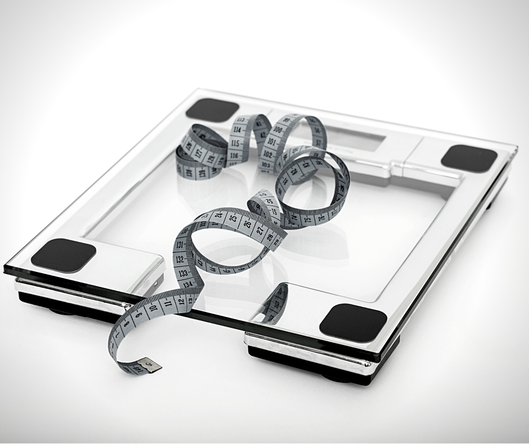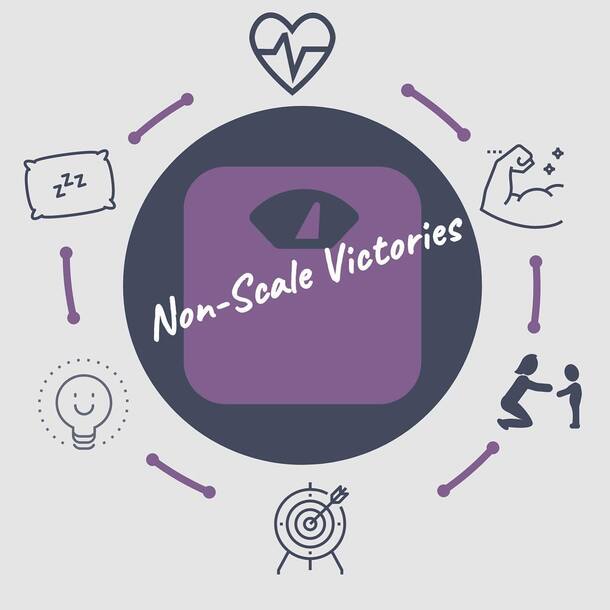|
At a doctor’s appointment in my early 20s, I asked what a healthy weight goal would be because I was once again in the midst of trying to lose weight. The doctor said, “Anywhere is better than where you are right now.” I remember it so vividly because it angered me, yet simultaneously validated my desire to be smaller. I weighed 175-180ish pounds at the time and was a size 12/14. He added, “You could get to 140. You’d be pretty thin.” At 5’10”, I had weighed anywhere from 160 to 190 since my teens…140 wasn’t a weight I had seen in many years. I don't think that doctor had my health in mind when he mentioned that number. Lighter and leaner doesn’t automatically equal healthier, yet on the whole, our culture tends to associate it with being better. The message we receive from a young age is that a woman should be physically attractive and that to be physically attractive, our bodies should align with the representations of beauty we see everywhere. Larger women were not included much while I was an impressionable youth. Even now, women who are more than a size 4 to 6 are typically dubbed as “other” in some way. We see descriptions such as ‘curvy’ ‘plus’ or ‘big-boned’. We witness women praised for weight loss and questioned or insulted for weight gain. I continue to see it today. I hear women exclaim, “You look great!” and gush over a woman who is smaller than the last time they saw her. Even if the reasons behind the weight loss are unknown. Not all weight loss is desired nor for positive reasons…this is why I tend to avoid praising weight loss and focus on other areas for compliments unless I know specifically that the person was working on it. I cannot pinpoint when my quest to become smaller began. I had been called fat, big-boned, and variations of chunky throughout my pre-teen and teenage years; it stuck with me. I have an old diary in which I occasionally berate myself for eating too much and for "being fat". In high school, I would occasionally put on one of my mom’s VHS tapes and Sweat To the Oldies or do Tae Bo along with Billy Blanks. I would try to eat fewer calories but inevitably I would revert back to old eating habits. Whole foods vs. processed foods and mindfulness wasn’t really a thing in the 90s. Healthy snacks were pretzels and anything else claiming to be low fat. In my 20s, I exercised on and off but I never had specific goals. I wanted to weigh less because I thought that would make me feel better about my body. Stepping on the scale was a regular occurrence and I was never happy with the number. Looking back, I’m not sure what number would have sufficed. My lowest weight occurred in my late 20s while I was calorie counting and exercising daily including HIIT and resistance training. I was 152 pounds. I felt good but at the same time not good enough. And I was hungry all of the time. I thought about food when I woke up and when I went to bed. This was not worth it. I stopped consistently exercising for a while as I let work and other priorities take over. I started to have more frequent back spasms. I felt tired and sluggish. I didn’t like the way my body looked but I really didn’t like the way I felt. I wanted to feel healthy, energetic, and strong. I explored my options for exercise and found a program that got me excited about moving again (Springfield East Jazzercise). I learned more about nutrition. I stopped stepping on the scale This time, I focused more on how I felt than what I weighed or my size. I’ve been consistently around the same weight for several years (based on doctor's appointments) and all signs point to it being a healthy weight for me. Even so, I still occasionally have those nagging thoughts that my body could be “better”....that I should be leaner or different in some way. Only now, I’m equipped to question these thoughts and re-frame them in a more positive way. Often weight loss goals are for legit reasons. Weight loss can be associated with health, specific performance or fitness goals, or preference. Weight loss is a personal thing and I’m not going to tell anyone that it’s wrong to want to lose weight. However, the tendency for a woman to think she isn’t worthy unless she’s thin or sees a specific read out on the scale is NOT right. If you do have weight loss goals, the reasons matter and shifting the focus to other non-scale/size goals is an important part of the process. It can be the difference between developing consistent healthy habits and getting frustrated and quitting. For many women, including myself, it is healthier to ditch the scale and use other means to track progress and change. Besides, the scale only tells one part of the story. The scale read-out doesn’t show body composition or water weight. It doesn’t show cardiovascular improvements or strength gains. The scale doesn’t show your first full push-up or a new personal record for a lift or a run. It doesn’t show the positive example you are setting for your family and friends. It doesn’t show the better sleep you are getting at night.
Before you get disappointed about that number, consider your other victories. Consistent exercise is tough when you aren’t seeing desired changes in your body. Even if you can’t see it, you are changing and it is worth it. If I only cared about the scale number going down, I wouldn’t be in the relatively body-happy place I am. By the way, I weigh about 10 pounds less than I did when that doctor told me that I could get to 140. I'm glad I never truly tried to get to that weight! It isn’t easy to overcome the smaller = better mindset. You have to be ready to change your focus and catch that inner voice that points out the “imperfections”. The way we talk to ourselves significantly impacts mood, motivation, how we feel about ourselves on a day-to-day basis, and how we interact with others. You have had a running commentary on your body going on in your head since puberty. It’s probably not been the most loving, has it? That’s a long time to put up with that bully in your head. The negative self-talk is not deserved and you can learn to be kinder to yourself, eventually. The first step is to catch negative thoughts as they occur. Acknowledge how you are thinking about yourself and challenge it. I know it can be difficult but it gets easier as you practice. Catch those negative thoughts you’ve had over and over and question that mean voice. Why are you saying this? Would you say this to your best friend? Next, change the language you use. You don’t have to change your negative statement to the complete opposite; it might make more sense for it to become a neutral statement at first. For example, “My belly is so fat.” doesn't have to become "My belly is perfect." It can become simply, “This is my belly right now.” Another option is to change the focus to emphasize the power you have to make positive changes. When a negative body thought crosses your mind, think about what actions you can take or have been taking. “I’m eating more veggies and working with my trainer. I’m getting stronger.” What about the comparison trap? This practice can help get you out. “I’m not as thin/strong/fit as I used to be.” could become, “I am capable of working on new goals. It serves no purpose to compare my body now to my body in the past.” You are more than your body. Your knowledge, compassion, humor, and usefulness cannot be measured by scales or tape measures. Your worthiness should not be determined by body fat %. I realize this may seem strange coming from a fitness professional. The fitness industry generally preys on women’s insecurities and promises fast weight loss, six pack abs, or lean toned bodies. I want you to be strong, healthy, and confident. If you want to lose weight, I want you do it in a sustainable, healthy manner. Let’s eat well. Move often. Take care of ourselves. But getting smaller simply for the sake of being smaller? Over it.
0 Comments
Leave a Reply. |
Archives
June 2023
Categories
All
|


 RSS Feed
RSS Feed